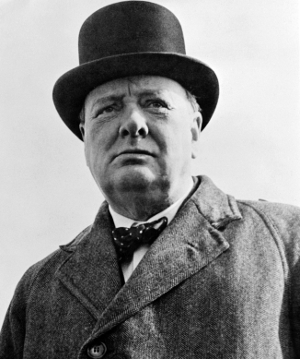Winston Churchill helps MPs defeat Twitter ban

"Those who want to fight the onslaught of technology on the beaches will find that the tide is turning against them"...
To tweet or not to tweet? That was the question on the minds of Westminster's political elite last week.
MPs voted against a motion that would have banned tweeting inside the House of Commons but not before some heated debate on the merits of tweeting from inside the Commons chamber.
Speaking in defence of politicians tweeting from the Commons, MP Kevin Brennan said Twitter's 140-character limit encouraged a tradition of succinct, punchy sloganeering that stretched back to Winston Churchill.

World War II leader Winston Churchill was evoked in defence of using Twitter in the House of CommonsPhoto: United Nations Information Office, New York
"There is nothing new in political communication in trying to get a message across in a pithy, memorable way, as Twitter enables us to do. In fact, I think it was a certain Winston Churchill who said: 'Never in the field of human conflict was so much owed by so many to so few.'
"If that statement was issued as a tweet, it would leave 66 of the 140 characters available on Twitter still to play with. That goes to show that those who want to fight the onslaught of technology on the beaches will find that the tide is turning against them."
Chris Bryant said Twitter provides constituents with a window on the workings of Parliament and helps politicians keep pace with modern technology.
"It is not a question of being dinosaurs or anything else - it is about opening Parliament up to the wider world around us, so that people can understand everything that goes on here," he said.
"The world has changed. When I was first elected in 2001, the vast majority of my constituents got in touch with me by coming to a constituency surgery. Now the vast majority get in touch by Facebook, Twitter, email and, sometimes, text messages. We should make that more possible for our constituents, not more difficult."
Rather than Twitter and Google damaging the quality of the debate, MP Claire Perry said having access to these services could lead to more informed exchanges inside the chamber.
"I was told as a new member of parliament by those who shall remain nameless, 'Never mind whether your facts are accurate. Just say them anyway'. Of course, I have never followed that advice, but there are many advantages of instantaneously being able to google an article or, for example, send a message to the chief constable of Wiltshire Police in order to deal with damning statistics being provided by opposition members.
"That is incredibly helpful to us in doing our job of holding the government to account and being good parliamentarians."
Twitter is becoming increasingly popular among politicians. Of the 650 MPs in the UK, some 300 have signed up for a Twitter account - with 100 joining the social network in the last six months.
But not all members are fans of Twitter or even...
...electronic devices being allowed inside the Commons chamber. Deputy leader of the Liberal Democrats Simon Hughes believes there is no place for smartphones or tablets inside the Commons.
"It looks pretty bad if members spend all their time looking at papers and other things that have nothing to do with a debate, but they look even less connected if they spend all their time playing with bits of electronic machinery. If we are here, we should be taking part in the debate, and the administration of our lives should happen outside," he said.
Sir Alan Haselhurst MP worries that allowing members to check Twitter during debates could allow them to become open to outside influence.
"I am aware that it will give me a good chance of becoming the leading candidate for the 'dinosaur of the year' award," he said.
"If it appears that we are being prompted from outside - which is entirely possible if handheld devices are produced in the House - our reputation will decline."
MPs resolved that electronic devices, apart from laptops, should be able to be used inside the Commons chamber in silent mode, as recommended by the Commons procedure committee, but voted against an amendment that would have banned Twitter.
The amendment, that electronic devices should only be used to "receive and send urgent messages, as a substitute for paper speaking notes and to refer to documents for use in debates, but not for any other purpose", was defeated by 203 votes against to 63 for.